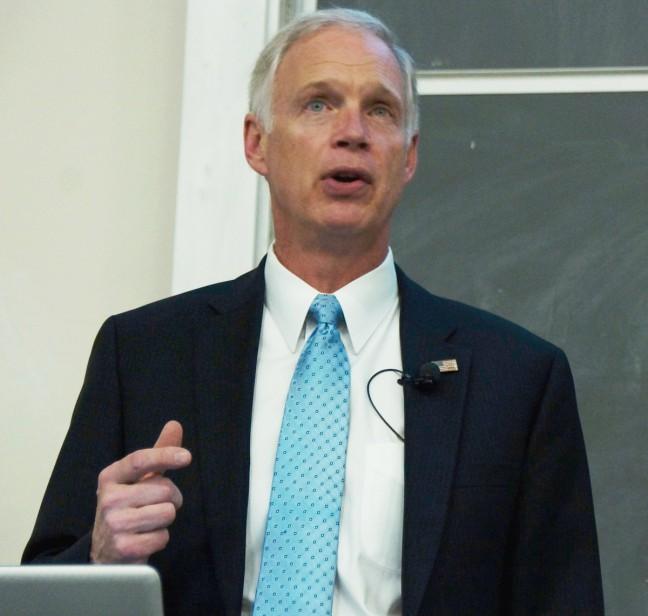While the presidential election dominates national and state headlines, Wisconsinites also have an upcoming Senate election to vote in. In many ways, there has never been such a stark contrast between two candidates.
Incumbent Sen. Ron Johnson, R-Wisconsin, an Oshkosh manufacturer who has just finished his first six years in politics, is taking on the man he defeated back in 2010: Democrat Russ Feingold, who has served most of his life in public office. Wisconsinites should have a senator who will best serve their interests. In my view, that man is Johnson.
It’s going to be a tough race for Johnson. Initially, many Wisconsin voters didn’t have enough information to form an opinion of him. The Marquette Law School poll at the end of August showed that 32 percent of voters didn’t have a favorable or unfavorable view of Johnson, compared to 25 percent for Feingold. Feingold has also gone back on his promise of not receiving out-of-state funding and has used an overwhelming amount of attack ads on his opponent.
Johnson has grown frustrated with Feingold’s ads, which have falsely attacked the senator on issues like trade policy, according to PolitiFact. Nevertheless, the Republican has been fighting his way back up. According to the October Marquette poll, 46 percent of likely voters back Feingold while 44 percent back Johnson. It is also worth noticing that those who hold no opinion of Johnson has decreased to 20 percent. The incumbent is fighting back. There’s an important reason why Johnson’s support has been improving as more voters receive his message: the successful plastics maker has also manufactured a stellar record in the Senate.
As the chairman of the Senate Homeland Security Committee, Johnson understands that the United States needs to have a powerful military to protect ourselves and our allies. In June, he introduced an amendment to allow enough funds for a 52-ship fleet of the latest high-tech Littoral class vessels. Currently, Defense Secretary Ash Carter has reduced the number of planned Littoral ships from 52 to 40. This is a dangerous idea, since the power and size of the U.S. Navy is necessary to guarantee global peace and safety.
Feingold, on the other hand, supports reducing the size of the navy. The navy has planned for the construction of 12 new submarines to replace aging subs that will no longer be in use. Feingold doesn’t see national security as priority and believes that there should be only eight submarines, but this gives our armed forces less flexibility.
He should spend more time listening to our military officials. Rear Admiral Joseph Tofalo has argued that less submarines would give our navy less capability to defend both oceans. Vice Admiral Terry Benedict said a lower number of submarines would be insufficient to meet our national commitments at a breakfast discussion in June 2015.
The two also differ on health care policy. Feingold voted for the Patient Protection and Affordable Care Act of 2011, more commonly known as Obamacare. The unpopularity of the law was one of the issues that contributed to his defeat in 2010, yet he still supports it.
Obamacare has been a disaster since its implementation. More than 37,000 Wisconsinites are expected to lose health insurance through the federal exchanges next year, while premiums are projected to go up an average of 15.9 percent. At a national level, more than 1 million people are expected to lose health insurance because of the terrible climate that has struck health insurance providers.
Johnson, on the other hand, understands that Wisconsin voters want a different law. Last year he proposed the Preserving Freedom and Choice in Health Care Act, which would repeal Obamacare’s individual mandate, employer mandate, and ends the penalties that punish Americans for not buying health insurance. His plan won’t be immediate, so those who have coverage through Obamacare will have time to adjust. This is what many Americans would prefer, as many don’t want to sign up, as shown through the federal government’s diminishing enrollment forecasts.
Lastly, both men have a different views on poverty. Johnson has backed the Joseph Project, a program created with the help of Greater Praise Church of God in Christ to help the poor get work training and find jobs. Originally based in Milwaukee, the Joseph Project has now expanded into Madison. Currently, the project has connected more than 140 people with job interviews, with more than 80 receiving employment offers.
Feingold prefers to recklessly raise the minimum wage to $15 an hour, believing it will solve economic hardships. Despite good intentions, the minimum wage has been proven to be counterproductive. A study from the nonpartisan American Action Forum found that such a high wage floor would cost 6.6 million jobs because of higher labor costs. The University of New Hampshire’s Survey Center found that 72 percent of American economists oppose the $15 minimum wage proposal. Thanks to his business experience, Johnson knows that the proposal would be disastrous.
Wisconsin has a big choice to make for the U.S. Senate. Feingold is a return to politics and policies that have continued to fail us. Johnson wants to put our state and our country on the right track. That’s why I voted for him, and encourage you to do the same.
John M. Graber (jgraber3@wisc.edu) is a junior majoring in history and political science.


